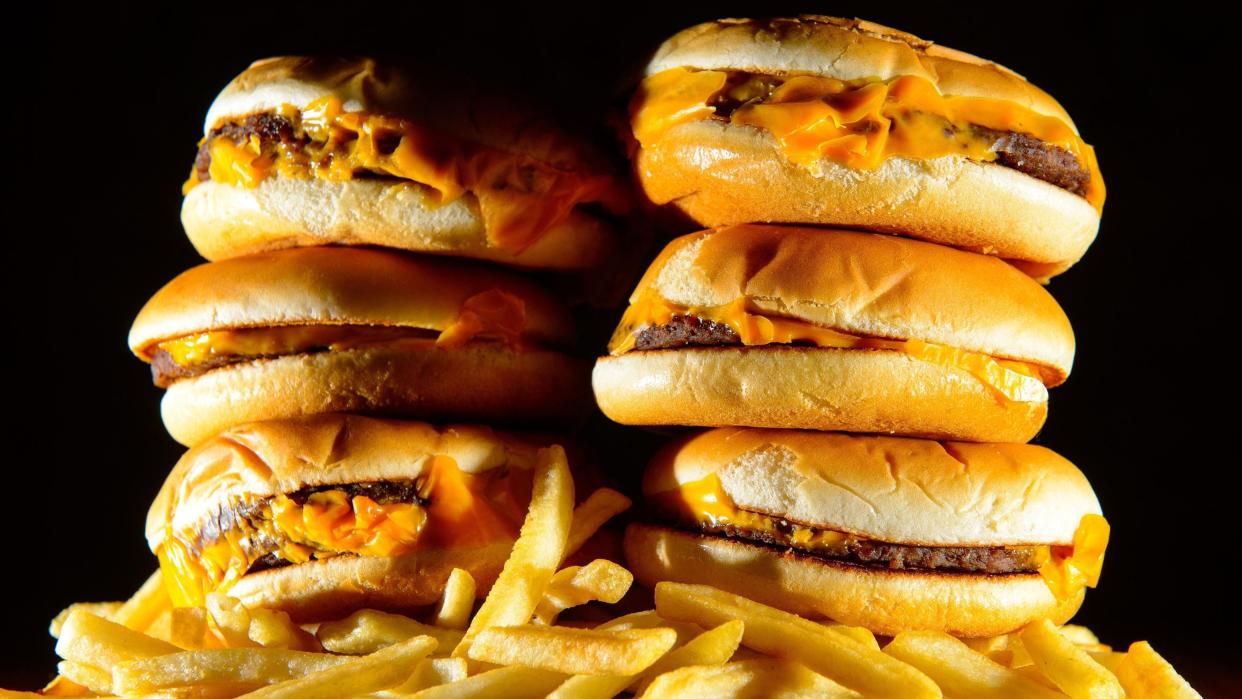What counts as junk food in upcoming UK online advert ban

Online adverts for junk food will not be allowed from next year under new government rules introduced to tackle childhood obesity.
The ban, which will also apply to adverts shown on TV before 21:00, will begin in October 2025.
Health minister Andrew Gwynne said the restrictions will “help protect children” from advertising that evidence shows can influence their eating preferences from a young age.
More than one in five children in England are overweight or obese by the time they start primary school, government statistics suggest. This rises to more than one in three by the time they leave.
What food and drink might be banned?
Under the new rules a particular food will be banned if it meets two criteria.
Firstly, if it is classified as “less healthy” on a government scoring system after its nutrients have been analysed – this includes salt, fat, sugar and protein.
Secondly, if it falls into one of 13 categories created by the government. They include:
Soft drinks: This covers any product that contains added sugar such as cola, lemonade and squash. It also includes fruit juice, smoothies and energy drinks.
Savoury snacks: Crisps mainly, but this also extends to crackers, rice cakes, tortilla chips and Bombay mix. There are exemptions for flavoured nuts, dried fruit and jerky.
Breakfast cereal: This includes granola, muesli, porridge oats and other items you would find in the breakfast aisle of a supermarket.
Chocolates and sweets: This applies to the vast majority of items you would find listed under confectionary, but also includes popcorn and chewing gum.
Ice cream: Dairy and non-dairy products, such as ice lollies, are covered by this as well as frozen yoghurt, sorbet and gelato.
Cakes and cupcakes: Flapjacks, doughnuts and éclairs are also included in this category - but icing is exempted.
Biscuits and bars: Protein and cereal bars are included, as are other products like wafers and toaster pastries.
Morning goods: Croissants, pain au chocolat and other pastries are the main foods covered here - but this category also extends to crumpets, scones, fruit loaves and hot cross buns.
Desserts and puddings: Custard, jelly and mousses are included, but there are exemptions for tinned fruit, cream and syrups.
Yoghurt: Any variety that has been sweetened is covered by this category, as are non-dairy alternatives, probiotic yoghurt and drinkable varieties.
Pizza: Plain bases and garlic bread are exempted from this, but otherwise all sizes and types of pizza are included.
Potatoes: Plain and sweet varieties that have not been cut or cooked are exempt, but several other potato-based products are included such as chips, hash browns and croquettes.
Ready meals: A broad category that covers anything intended to be eaten as a main meal, often after being reheated, and requires no further preparation. It also includes sandwiches and burgers.
Other foods also exempted from the ban include infant formula and baby food, weight control products, meal replacement products, food supplements and drinks used for medicinal purposes.
Are there other junk food restrictions?
An advert ban is not the first government policy designed to help people eat less junk food - and generally consume fewer calories - that has been introduced in recent years.
Restrictions implemented in 2009 meant junk food could not be shown during the broadcast of programmes aimed at under-16s.
The policy also prohibited celebrities and animated characters from promoting claims about how healthy these food products were to children of primary school age and under.
A tax on soft drinks was announced in 2016. By 2019, it had helped remove around 45,000 tonnes of sugar from drinks sold in Britain, according to a report by Public Health England.
This is because manufacturers changed their recipes to lessen sugar content, which then reduced the tax they had to pay on sales of their drinks.
In April 2022, it became a legal requirement for hospitality businesses employing at least 250 staff - such as restaurant and café chains - to print how many calories were in each dish on their menu.
That same year, medium-to-large supermarkets in England were also stopped from displaying certain unhealthy food and drink in particular areas.
Do other countries have similar bans?
The UK government first began discussing the need to limit junk food advertising in the 1990s. A 2001 report by the National Audit Office showed obesity in England had trebled in the previous 20 years.
Shortly afterwards, the UK’s chief medical officers called obesity a “time bomb”, warning that otherwise healthy lives would be cut short and NHS costs would increase.
Other countries are also considering a ban on TV adverts for junk food aimed at young people.
Norway will ban marketing aimed at under-18s for products like soft drinks, sweets and ice cream.
Portugal has restricted the advertising of unhealthy food on TV and radio at broadcast times when at least 25% of the audience is made up of under-16s.
The EU published a report in 2023 recommending that member nations adopt restrictions on junk food marketing targeting under-18s across all media platforms. The policy has not been approved yet by the European Parliament.

Dr Xand van Tulleken and Dr Dolly van Tulleken join Adam Fleming on Newscast to chat about confusing portion sizes, ultra-processed foods and how the government could act to improve Britain’s diet.
Newscast - Junk Food for Thought






